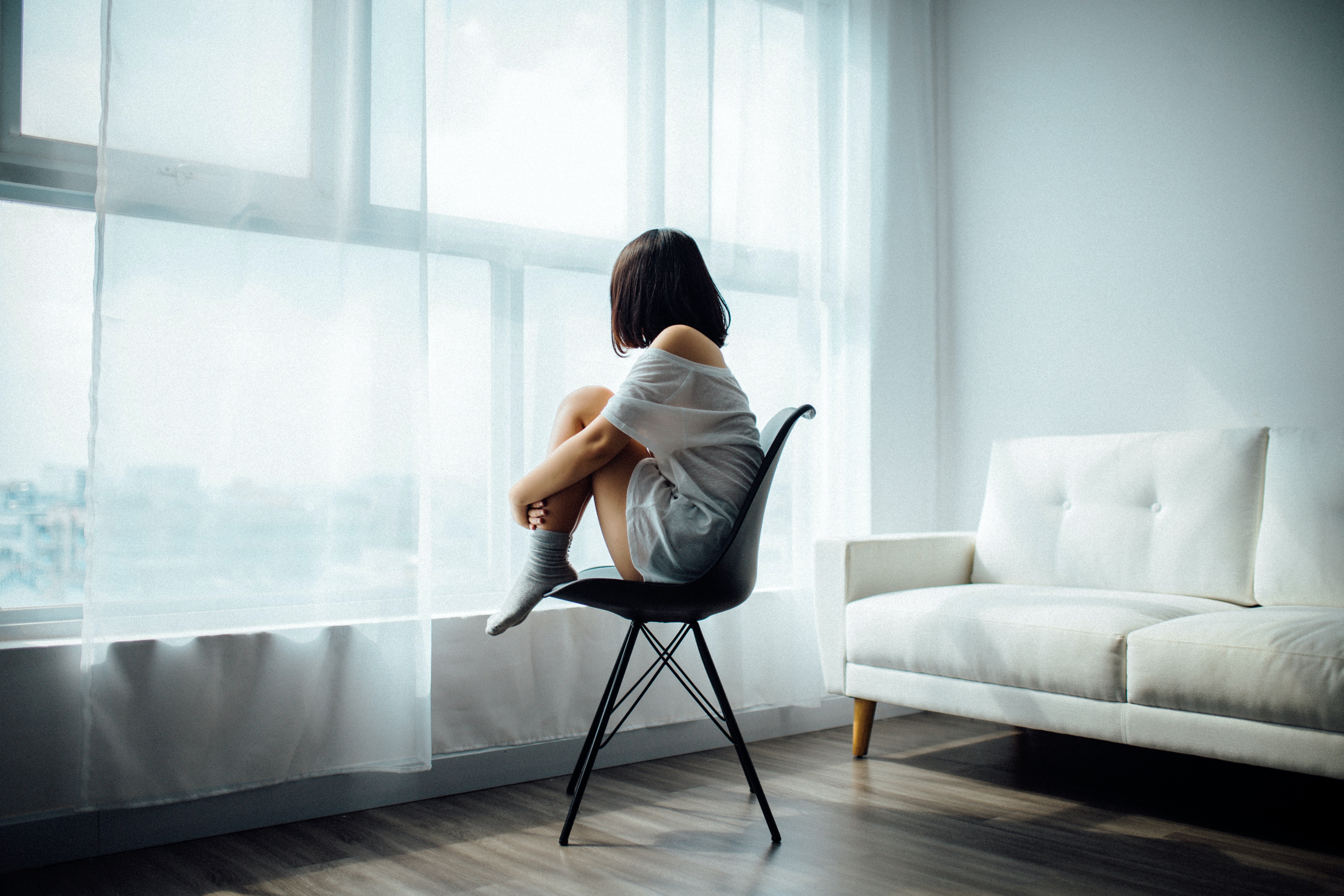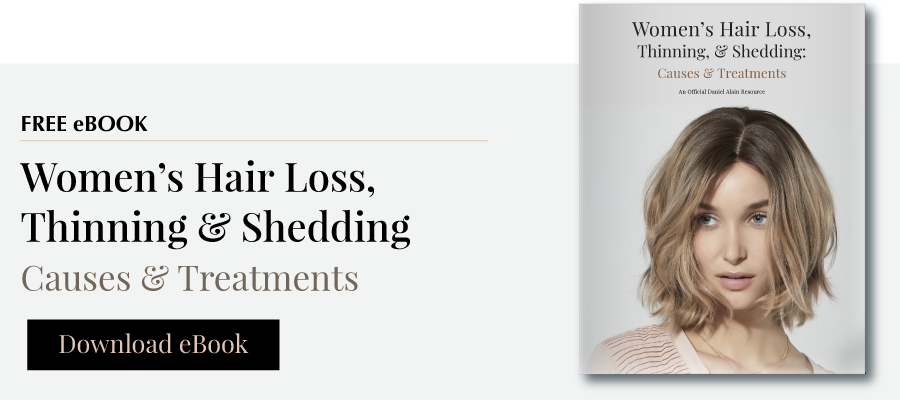Hair loss and mental health are two topics that are often stigmatized. With recent reports of a rising mental health crisis and a discussion around hair loss following the Oscars, these once-taboo conversations are being discussed more and more. While on the surface the two may not appear to be directly related, hair loss can be exacerbated by underlying mental health conditions. The inverse is true as well; mental health can be impacted by hair loss. When you begin experiencing problems with one or the other, you may end up experiencing problems with both.
Struggling with mental health and struggling with hair loss can often feel isolating. Both can cause one to look at themselves in the mirror and struggle to recognize the person looking back. Both can interfere with a sense of self and damage self-esteem. While both of these issues are often treatable, the stigma that both carry can make it difficult to have an open dialogue about either.
At Daniel Alain, we know how much hair loss can take from a person. We also know how tied our image can be to our sense of self. In previous articles, we’ve written about how stress can worsen hair loss. In this article, we’re going to talk about the stigma surrounding both mental health and hair loss. We’re going to discuss how the two are related and offer suggestions on how to cope with both.
Mental Health’s Impact On physical health
Simply put, mental health is the overall well-being of your mental state. Since the COVID-19 pandemic began in early 2020, there have been increased reports of people suffering from anxiety and depression. While there are a plethora of mental health conditions, these are two of the most common mental health issues people struggle with. Recently, reports have circulated covering the growing mental health crisis, especially among young people.
Mental health is difficult for some to talk about because it isn’t always obvious if someone is struggling with mental health. Media depictions of mental health are often exaggerated or show the worst. Many people who struggle with mental health do not want to be associated with images in movies or on television and will suffer in silence rather than reach out.
Because mental health is not easily seen, when people try to open up about their struggles, they may feel they are shut down or told, “But you don’t seem depressed,” which discourages them from speaking up and asking for help. Increased isolation and a general sense of panic and fear have caused an uptick in anxiety and depression. 
Struggling with mental health causes chronic emotional stress. However, it can also cause chronic physical stress. Though mental health issues manifest in different ways in different people, the typical inability to be calm that comes with struggling with mental health keeps the body in constant fight or flight mode. When the body is constantly assessing everything as a perceived or potential danger, leaving it in a perpetual state of fight or flight, the body becomes stressed.
Mental health distorts typical thought processes, causing abnormal thought patterns. Abnormal thought patterns are huge indicators of anxiety or depression. While someone who isn’t suffering from a mental health condition may not ruminate on misspeaking in a meeting, someone with anxiety may think about the minor infraction for days after, wondering who else noticed and how many people are judging them. Constant worry and getting stuck in negative thought patterns also cause an immense amount of stress.
Stress can be a cause of hair loss.
How Mental Health Relates to Hair Loss
While hair loss can be caused by an array of factors, if paired with an underlying mental health condition, the issue can be worse. As noted, chronic stress contributes to hair loss. Mental health conditions can distort thought patterns and can distort how we view ourselves. If someone is having a depressive episode and looks in the mirror, they may struggle to identify with the person looking back. They may nitpick at their appearance.
If this person is under constant stress, they may notice an increase in hair loss. Paired with an underlying mental health condition, they will struggle even more to simply look at themselves in the mirror. They may feel like the entire world can tell they’re losing their hair. They may refuse to leave the house or engage in certain social events because of the anxiety that accompanies their hair loss.
This avoidance is common in individuals experiencing hair loss, even if they don’t have an underlying mental health condition. Our hair is often tied to how we perceive ourselves. When you feel like you’re losing a part of yourself, you begin to question who you are and may stop doing things you like out of the fear of being judged. This can cause depressive-like symptoms. You don’t feel like you. Other people may notice a change in behavior. The associated stress of hair loss can worsen both hair loss and any downturn in mental health.
When these two conditions work together, one might feel extremely overwhelmed and unsure how to cope. They may feel alone and scared.
Coping With Mental Health and Hair Loss
While there is no easy, one-size-fits-all solution for mental health or hair loss, there are ways to cope.

If you’re wondering how to cope with mental health….
- Journal and write out your thoughts and emotions. When we feel isolated, we may avoid talking to people or feel unable to. However, keeping all your thoughts and feelings inside will strengthen these negative feelings. The simple act of writing it out can get some of the tension in your mind out and provide some relief
- Talk to a professional. If you’re struggling with your mental health but don’t necessarily feel comfortable talking to friends or family, try online therapy or reach out to a therapist who can help you work through any feelings and help restructure negative thought patterns.
- Exercise. Duke University published a study in 1999 showing that exercise was almost as effective as medication in tackling depressive symptoms. Exercise boosts endorphins. While in the depths of a tough time it may be hard to get out of bed, even a 20-minute walk can boost your mood.
- Eat well. Surprisingly, studies have shown that what you eat directly impacts your mood. Choosing more whole foods, like fruits and vegetables can alleviate depressive feelings.
If you’re wondering how to cope with hair loss…
- Address any underlying mental health concerns. If you’re worried your mental health may be worsening your hair loss, take the aforementioned steps to help make this tough time a bit easier. If chronic stress is triggering hair loss, taking care of your mental health will help with hair loss
- Eat well. Eating well ensures you are getting the vitamins and minerals you need, which can help strengthen your hair and prevent further loss.
- Get support. Find a support group, whether virtual or in-person, with others who are experiencing hair loss. This can alleviate the sense of isolation that can go with hair loss. It may also give you tips and advice on how to deal with your hair loss.
- Explore solutions and educate yourself. Depending on what is causing your hair loss, you can look into solutions. Read up on possible causes and solutions. Perhaps you want to take a test to determine what’s causing the hair loss. Maybe it’s time to invest in a hairpiece. Hair loss can leave one feeling helpless when one feels it's out of their control. While to a degree, it is, there are certain aspects of hair loss within one’s control. You can control your response and take action, which can alleviate feelings of helplessness or confusion.
If you’re experiencing distress from hair loss, looking for solutions with an empathetic guide may be helpful. While hair loss doesn’t have an easy answer, working with an expert can help you feel more informed about both causes and solutions. At Daniel Alain, we offer private consultations with experts that are not only here to help you find a solution that works for you but to listen and offer support on your journey. Having an answer, or finding your way, can help ease the anxiety that comes with both hair loss and mental health conditions.
No one needs to suffer alone or in silence. Reach out and get the support you need to get back to feeling like your best self.



